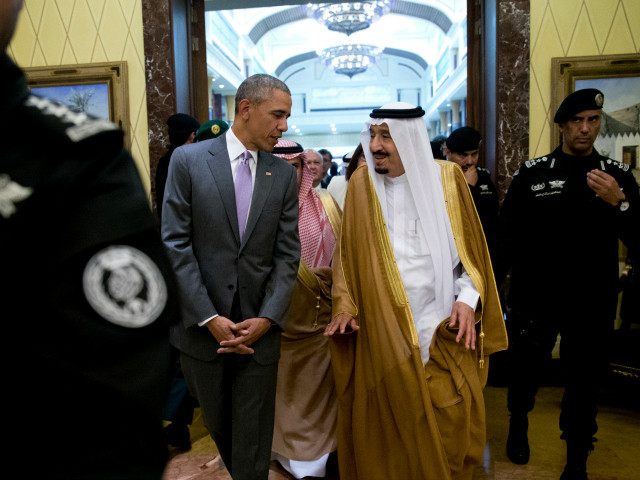The White House spent a good deal of President Obama’s first day in Saudi Arabia trying to spin away the unmistakable snub dealt by King Salman, who personally greeted the leaders of other Gulf nations at the airport but left Obama to be welcomed by the governor of Riyadh and the Saudi foreign minister.
As CBS News observes, Saudi television did not even bother to broadcast Obama’s arrival.
With everyone on Earth except the White House press office getting that message loud and clear, President Obama proceeded to his meeting with the King, to repair what CNN describes as an alliance “strained” by “the conflict in Yemen, the role of Iran, Lebanon’s instability and the fight against ISIS.”
Interestingly, one of the “thorny” issues glossed over at the meeting was the Saudi threat to wage economic warfare against the United States, if the president signs the bill to declassify the famed “28 pages” of documents purportedly linking Saudi officials to the 9/11 terror attacks. If these documents are made public, it could lead to lawsuits against the Saudis by families of the victims.
CNN looks past that issue to dig into the real meat of the tension between the U.S. and Saudi Arabia: Iran.
The Saudis have little confidence in Obama’s commitment to their security and fear he’s shifting U.S. attentions to its rival, Iran; Obama has described the Saudis as “so-called allies” and has complained their policies fuel anti-U.S. terror and regional chaos.
In the U.S. Congress, a growing drumbeat of criticism about Saudi Arabia is finding expression in efforts to restrict arms sales to Riyadh, expose alleged Saudi involvement in the September 11 terror attacks and allow it to be sued for that day’s destruction and death.
The clamor coincides with increasing domestic energy resources that lessen the U.S. need for foreign oil. Moreover, the allies are divided by a slew of issues including the approach to the wars in Syria and Yemen, the Iranian nuclear deal and the influence Tehran wields in Iraq.
Also annoying to the Saudis were President Obama’s lack of support for Hosni Mubarak in Egypt, his flaccid performance after Iran-backed Syrian dictator Bashar Assad crossed the chemical-weapons “red line,” and Obama’s insinuation that the Saudis were “free riders” on regional security.
CNN cites analysts who say the Saudis have a bit less influence with the U.S. government thanks to increasing American energy independence, but the Kingdom still has plenty of clout, thanks to the geostrategic importance of its oil, their hefty purchases of American arms, and its diplomatic influence across the Muslim world.
The Saudis have also stepped in to support key U.S. allies like Egypt, Bahrain, and Jordan during tough times, and have even been developing a better relationship with Israel.
“The overall U.S. war on terrorism in the Middle East cannot be won without Saudi help,” declared David Ottaway of the Wilson Center.
Reuters describes the Saudis and their Gulf Arab allies as “exasperated” by Obama’s foreign policy, and “sorely disappointed” with his presidency — once again bringing up Iran’s rising power as a primary complaint.
According to the White House, Obama and King Salman “reaffirmed the historic friendship and deep strategic partnership between the United States and Saudi Arabia” during their talks, and “discussed the challenges posed by Iran’s provocative activities in the region, agreeing on the importance of an inclusive approach to de-escalating regional conflicts.”
That sounds like a little spin to suggest Obama’s notion of “cold peace” between Iran and the Sunni monarchies, while they team up to extinguish the Islamic State, was much better received by Salman than it probably was.
Likewise, when President Obama talks about working to reinforce the cease-fire in Syria, the Saudis just hear “Assad wins” and grind their teeth, seeing little chance that Assad and his Iranian backers will cede power over the country during any “political transition.”
“The GCC [Gulf Cooperatoin Council] secretary general said the bloc and the United States would stage joint maritime patrols to stop weapons smuggling to Iran. American officials said these were already taking place and did not represent a new step,” Reuters writes. It sounds like the Obama administration is still taking exquisite pains to avoid irritating Iran, while the Gulf states are eager to claim American support against Tehran.
Tehran is going to put that strained U.S.-Saudi alliance to the test. Even as President Obama was getting settled into Riyadh, Supreme Leader Ayatollah Ali Khamenei fired off what Reuters describes as “a string of fiery Tweets” castigating the Saudis for trying to isolate Iran’s terrorist puppet Hezbollah.
“Hezbollah is shining in the Muslim world. It doesn’t matter if a corrupt, dependent and hollow government with the use of petrodollars condemns it in a statement. To hell with it,” railed the Ayatollah.

COMMENTS
Please let us know if you're having issues with commenting.